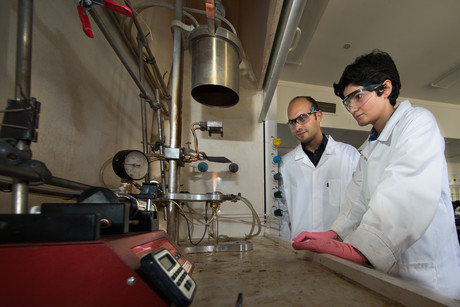Award-winning wearable sensor technologies could transform personalised medicine

The Australian National University (ANU) has announced the winner of its inaugural Grand Challenge Scheme — a $50 million initiative to provide funding for transformative research with the potential to radically change our understanding of, and responses to, the world’s most intractable problems.
The 2017 winner, ‘Your Health in Your Hands’, is a project that aims to revolutionise personalised medicine through wearable sensor technologies with genomics, tailored to individual need and irrespective of geographical location or social circumstances, to ensure that health care can be provided equally and effectively.
The five-year project, which beat several rival research bids, promises to help clinicians detect diseases in people much earlier than is currently possible, as well as better manage their conditions. It involves more than 60 researchers, including immunologists, engineers, physicists, chemists and health services experts from across the university.
“There’s been tremendous progress in medicine over the past 100 years, but we’re still left with this problem of chronic diseases that require long-term management,” said co-lead researcher Professor Matthew Cook, from the Department of Immunology at The John Curtin School of Medical Research (JCSMR) and the ANU Medical School.
“If we could diagnose those earlier, or if we could treat them more effectively when they’re established, that would be enormous progress. Making an early diagnosis depends upon being able to detect the markers of the disease sooner.”
Co-lead researcher Associate Professor Antonio Tricoli, from the Nanotechnology Research Laboratory at the ANU Research School of Engineering, said he and his fellow researchers are using a combination of nanotechnology and electronics to develop “the next generation of wearable sensors”.
“This will enable us to harvest the huge amount of information that the body gives us continuously and spontaneously,” Associate Professor Tricoli said. “This does not require blood analysis, because the information is in your breath, in your sweat, and we are able actually with this information to understand how you’re doing.
“People will be able to collect essential information about their health, just by going about their normal daily activities such as brushing their teeth or taking a walk.
“This will enable us to get a holistic picture of their health and understand the development of diseases before they happen, better monitor the ones that exist already and manage them better.”
Co-lead researcher Dr Jane Desborough, a health services expert from the ANU Research School of Population Health, noted that patients and others involved in the treatment of disease will be part of the project. She stated, “The most important part of implementing this technology is that we work with patients, carers and their families, and with health services and policymakers, from the very beginning so that we can translate this knowledge into practice effectively.”
The Grand Challenges Scheme was set up by ANU Vice-Chancellor Professor Brian Schmidt, who described the winning project as “outstanding”.
Retinal health linked to dementia risk, study shows
Researchers have discovered that the blood vessels at the back of the eye — called retinal...
Pancreatic cancer hijacks metabolism switch to help it spread
Pancreatic cancer hijacks a molecule known for regulating physiological processes, such as food...
Novel antibiotic activates 'suicide' mechanism in superbug
Researchers have discovered a new class of antibiotic that selectively targets Neisseria...




